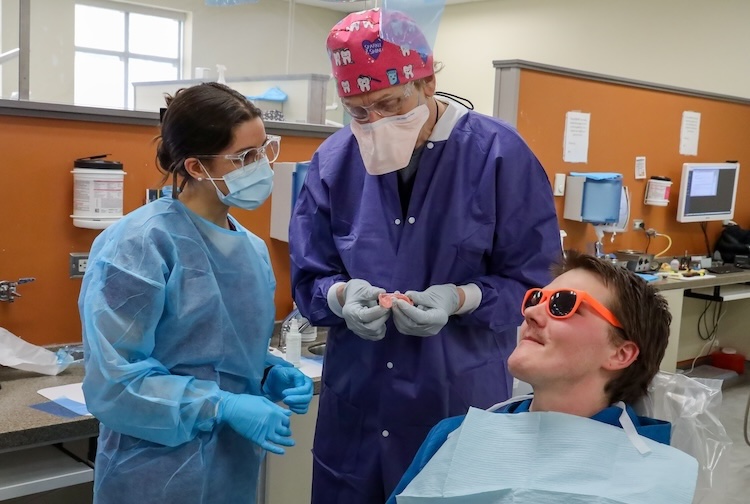
How safe are nicotine pouches? 'Tobacco-free' does not mean 'risk-free,’ VCU expert says
Alexandra Howell, DMD, of the VCU School of Dentistry, urges nicotine pouch users to prioritize dental screenings for health problems.
June 24, 2024 While the pouches are marketed as a way to help smokers quit, researchers note that the amount of nicotine in these products is often higher than nicotine replacement therapies. (Getty Images)
While the pouches are marketed as a way to help smokers quit, researchers note that the amount of nicotine in these products is often higher than nicotine replacement therapies. (Getty Images)
By Sara McCloskey
A nicotine product marketed as an alternative to smoking – and a potential way to quit – is gaining popularity, but experts say there are still concerns when it comes to your health.
Nicotine pouches are dissolvable pouches with a nicotine powder mix that doesn’t have tobacco leaves. One of the popular brands is ZYN, of which 350 million cans were sold the United States in 2023 – an increase of 62% compared to the previous year.
The amount of nicotine in oral pouches, like ZYN, is similar to smokeless tobacco products, such as snus and snuff which are placed in the lip to be absorbed through the gums.
“Nicotine pouches are marketed as a nicotine product that provides a buzz without the harmful effects of tobacco or smoking. However, people using these products should be aware that ‘tobacco-free’ does not mean ‘risk-free,’” said Alexandra Howell, DMD, oral medicine specialist and assistant professor in the Department of Oral Diagnostic Sciences at Virginia Commonwealth University’s School of Dentistry.
As researchers are still studying the health impacts of these newer nicotine products, federal health experts note smokeless tobacco products are still causing serious health problems, including nicotine addiction and diseases of the mouth.
“While these pouches may seem like a convenient way to consume nicotine, people should be aware of the potential oral health risks,” Howell added.
Howell spoke with VCU Health News about the impact nicotine pouches have on your teeth, gums and mouth as well as other health considerations for people using smokeless tobacco or oral nicotine products.
What is in smokeless tobacco products and nicotine pouches that could be harmful?
When considering smokeless tobacco, individuals who dip or chew get about the same amount of nicotine as regular smokers. Additionally, they are subjected to at least 28 carcinogenic chemicals. Among these, tobacco-specific nitrosamines (TSNAs) pose the most significant cancer risk. The concentration of TSNAs differs among products, with higher levels correlating to increased cancer risks.
The U.S. Food and Drug Administration has established a list of chemicals that are called HPHCs – Harmful and Potentially Harmful Constituents – that are in tobacco products that cause or could cause harm to smokers or nonsmokers. While these oral nicotine products don’t seem to contain TSNAs, they still have been found to have low levels of several of these HPHCs.
The cancer risk associated with newer variants of smokeless tobacco or oral nicotine products remains somewhat uncertain, primarily due to limited research compared to traditional chewing tobacco and snuff. Nevertheless, these newer products still harbor potentially detrimental chemicals that could elevate cancer risk.
What other health problems are associated with nicotine pouches and smokeless tobacco products?
Nicotine pouches present several cardiovascular risks due to the nicotine content. The use of these products can lead to increased heart rate and blood pressure, which may increase the risk of developing cardiovascular diseases such as hypertension, heart disease, and potential heart attacks.
As far as the potential oral side effects are concerned, many users report significant mouth sores and gum irritation, particularly in the area where the pouch is placed. The continuous exposure to nicotine and other ingredients, like artificial flavorings and sweeteners, can lead to inflammation, redness, ulcers and swelling. Over time, this can contribute to gum recession, exposing the roots of the teeth and increasing sensitivity and risk of cavities.
Nicotine has also been shown to reduce saliva production, leading to dry mouth. Saliva is crucial for neutralizing acids produced by bacteria in the mouth, washing away food particles and helping digestion. A lack of saliva can result in an increased risk of tooth decay, mouth irritation, bad breath and other dental problems.
Traditional smokeless tobacco is still known to cause gum disease, dental decay, and tooth loss. In addition, it can also cause white or gray patches inside the mouth, called leukoplakia, that can lead to cancer.
Are nicotine pouches safer than vaping?
According to the Centers for Disease Control and Prevention, no tobacco products, including vapes or e-cigarettes, are safe. Nicotine, which is found in tobacco products, is addictive. In general, tobacco-free nicotine products, like ZYN pouches or vapes, were originally developed as tools to help people quit smoking, and they are not intended for those who do not already use tobacco or nicotine products.
Some research shows that the oral pouches’ nicotine levels are higher than medications prescribed by a doctor to help smokers quit, called nicotine replacement therapy.
The dental and medical communities are urging for more comprehensive research to fully understand the long-term effects that these increasingly popular nicotine products have on oral health.
It is crucial that people who use these products prioritize regular dental check-ups to screen for these potential issues and maintain good oral hygiene daily.


.ashx)
